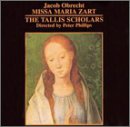Scrumptuous Early Renaissance Polyphony
10/14/1998
(5 out of 5 stars)
"This is an irresistible album. I had not realized how melodically inventive and engaging Obrecht is. And the intonation and balance, and just the sheer beauty of sound of the Tallis Scholars are phenomenally good. This is a great way to start for someone who has never sampled renaissance music, and a great way to try Obrecht for someone who already likes the renaissance. The Tallis Scholars have a number of great albums, but this is close to the best. Excellent recorded sound."
Expansively poetic
NotATameLion | Michigan | 07/25/2000
(5 out of 5 stars)
"I would have to ponder for a long, long time if someone were to ask me what my favorite Tallis Scholars album is. In the end, I would not be able to pick just one; although Obrecht's Missa Maria Zart does occupy a special place in my collection.Obrecht was among the greatest Franco-Flemish composers of the Renaissance. His polyphony was characterized by a markedly northern style. That style is on full display here.This music is expansively poetic. The Gloria in particular is lush and enthralling. The interplay of the voices on the shorter phrases is breathtaking. It is amazing how much beauty is here on one recording. I give this disc my highest recommendation."
Superior Early Rennaissance Performance
B. Marold | Bethlehem, PA United States | 11/02/2006
(5 out of 5 stars)
"The Tallis Scholars' performance of Jacob Obricht's 'Missa Maria Zart' is definitely a cut above the average Tallis Renaissance offering. It is certainly better than Johannes Ockeghem's 'Au travail suis' plus material from Gilles de Bins dit Binchois and Barbingant (?) which is a very good, well executed series of Renaissance liturgical pieces. I find, however, that it is simply not quite as interesting as the Obrecht piece which gains from being a bit longer than the Ockeghem offering, and also for being the recording of a single Mass, with all the usual five parts, Kyrie, Gloria, Credo, Sanctus & Benedictus, and Agnus Dei. The Ockeghem recording offers two different masses with these five parts, but neither seem to stand out quite so well as the Obrecht work or the later Palestrina masses.
I will suggest that the very nicest thing about the Ockeghem masses is that they are short, and therefore much less challanging if one is interested in using these pieces in an actual liturgy or as a part of a longer performance."


 Track Listings (5) - Disc #1
Track Listings (5) - Disc #1